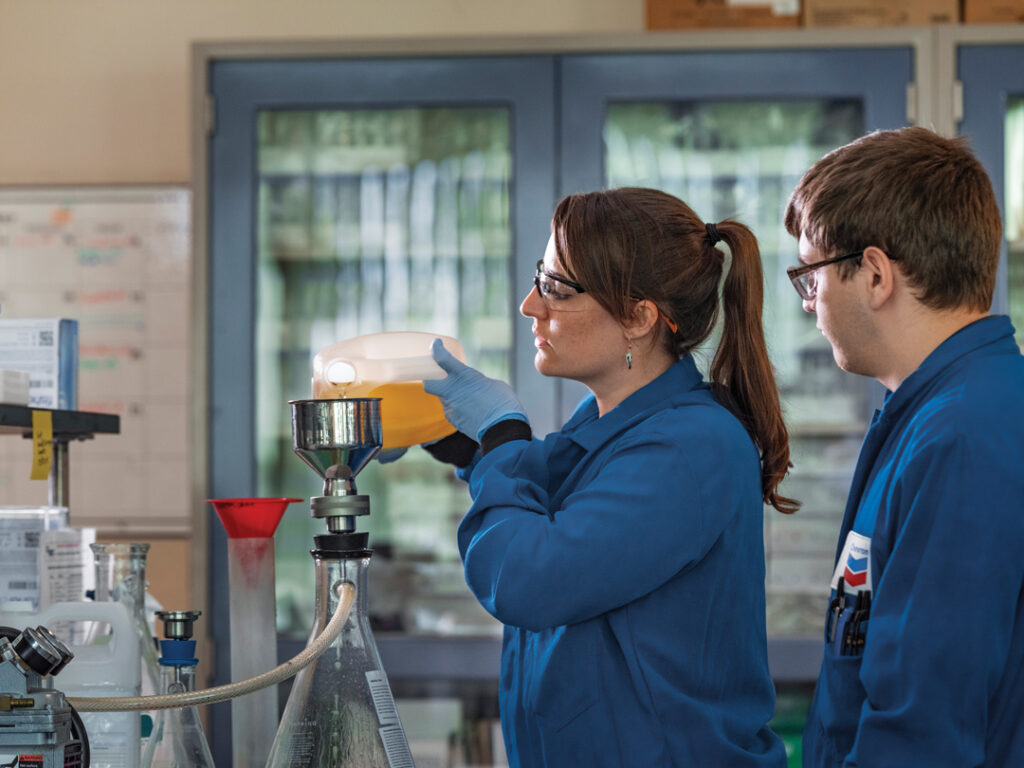MWA to expand gas-to-electricity plant
Public-private project will expand production of electricity from landfill methane gas

When asked to name alternative energy sources, Iowans naturally think of wind power, and solar and geothermal aren’t far behind. But unless you’re in the waste management industry, you may be surprised to learn that a fair amount of electricity is produced locally from methane, a landfill byproduct.
Built in 1994, the Metro Methane Recovery Facility at the Metro Park East Landfill near Mitchellville operates on a nearly 24/7 basis. Operated by Waste Management of Iowa Inc. under a long-term contract with Metro Waste Authority (MWA), the generating plant produces enough electricity to power more than 10,000 homes, businesses and schools in eastern Polk County annually.
Methane is collected from more than 120 wells drilled into the landfill and piped to the recovery facility, where the gas is purified and then used to fuel eight 1,150-horsepower engines to produce electricity.
Under federal environmental regulations, landfill operators are required to dispose of methane as it’s produced. The methane recovery facility provides an alternative method for eliminating the gas, which would otherwise be ignited and flared off as it’s vented from the ground. A greenhouse gas that contributes to global warming, methane is 20 times more potent than the same amount of carbon dioxide in its effect on the atmosphere.
Now, as use of the landfill has increased, the methane produced has outgrown the capacity of the existing plant to use it, and MWA is preparing to expand its electricity-producing operations with construction of another generating plant at the landfill. The expansion of the facility provides a double-win for the environment, said Tom Hadden, the agency’s executive director.
“The beauty of this project is that we have to take care of the methane,” Hadden said. “So it has really saved us from having to collect and destroy the methane, which is something we would have to do anyway. That’s why it’s a really good partnership.”
In the mid-1990s, landfill gas-to-energy projects were just getting started in the United States. Today, more than 550 landfills across the country are equipped with methane recovery systems, generating enough electricity to power more than 1 million homes, according to data from the U.S. Environmental Protection Agency (EPA). More than 500 additional landfills are good candidates for gas-to-energy projects, the EPA estimates. Metro Waste’s Polk County facility is one of five operational gas-to-energy projects in the state and two others are under construction, according to the EPA.
An independent government agency, MWA owns and operates the landfill for Polk County and 16 Central Iowa communities.
Because MidAmerican Energy Co. wasn’t offering a large enough incentive to make an investment in an additional plant cost-effective, MWA had to seek out electricity buyers beyond Central Iowa, Hadden said. The agency hired NCP Inc., a Des Moines investment banking firm, which located a wholesale electrical supplier interested in purchasing the electricity the additional plant would produce.
The Municipal Energy Agency of Nebraska (MEAN) agreed in February to purchase 6 megawatts, or about one-third of the proposed plant’s generating capacity, which will be used by 11 communities that MEAN supplies, including four utility systems in Iowa: Indianola Municipal Utilities, the city of Carlisle, the city of Sergeant Bluff and Waverly Light and Power. The 11 participants also include utilities in Nebraska and Colorado.
The power agreement “demonstrates municipal utilities’ commitment to balancing energy production costs and reducing the impact that production has on the environment,” said Gary Stauffer, executive director of MEAN, a Lincoln, Neb.-based supplier organization that serves 66 communities in Colorado, Iowa, Nebraska and Wyoming.
“I think what’s unique about this,” Hadden said, “is that we were proactive in seeking buyers for the energy so that we could make it cost-effective for Waste Management to make the investment.” In addition to dealing with the methane, MWA will receive 8 percent of the revenues from the project, he noted.
Though some environmental groups have expressed concerns that such projects could encourage the use of landfills rather than recycling, proponents say that gas-to-energy initiatives are valuable because they generate electricity that would otherwise come from carbon-emitting sources. For that reason, Hadden said he doesn’t anticipate any opposition to the project, which is now undergoing the permitting process with the Iowa Department of Natural Resources.
Depending on the permitting process, Metro Waste hopes to have construction begin in October and for the plant to be on line by next summer.
To view a short video explaining how landfills can power homes, college campuses and more, visit the Waste Management video, “Landfill Power: Turning Gas into Energy.” http://www.youtube.com/watch?v=w1RKMMpRRHY









